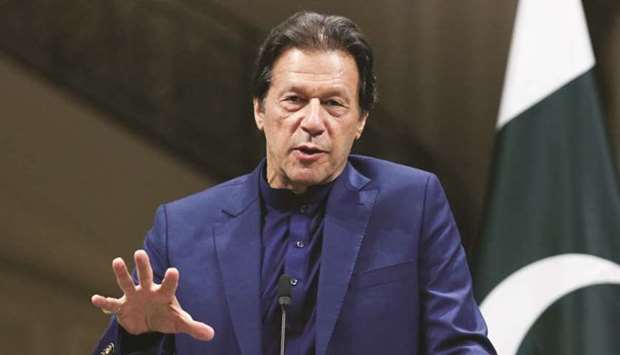Western governments should treat people who insult the Prophet Muhammad (PBUH) the same as those who deny the Holocaust, Pakistan Prime Minister Imran Khan said yesterday.
Speaking after a week of violent protests in Pakistan by a radical party outraged by French government support for magazines publishing cartoons of Prophet Muhammad (PBUH), Khan said insulting the Prophet (PBUH) hurt Muslims around the world.
“We Muslims have the greatest love & respect for our Prophet (PBUH),” he tweeted.
“We cannot tolerate any such disrespect & abuse.”
The group Tehreek-e-Labbaik Pakistan (TLP) was banned Thursday after days of violent protests during which four policemen were killed.
The radical party has orchestrated a months-long campaign for the expulsion of the French ambassador to protest against President Emmanuel Macron’s defence of the cartoons’ publication.
“I... call on Western govts who have outlawed any negative comment on the holocaust to use the same standards to penalise those deliberately spreading their message of hate against Muslims by abusing our Prophet (PBUH),” Khan tweeted.
Denying the Holocaust is illegal in several European countries — including Germany and France — and offenders can be jailed.
Khan suggested the government had not banned the TLP because it disagreed with TLP’s motivation, but rather its methods.
“Let me make clear to people here & abroad: Our govt only took action against TLP under our anti-terrorist law when they challenged the writ of the state and used street violence & attacking the public & law enforcers,” he said.
“No one can be above the law and the Constitution.”
Meanwhile, the French community in Pakistan is torn between disbelief, fear and annoyance in reaction to their embassy’s call for them to leave the country after Francophobic rioting this week by an extremist party.
Most, it seems, have decided to stay put.
In a terse three-line e-mail, accompanied by the words “urgent”, the embassy in Islamabad on Thursday recommended its nationals and French companies temporarily leave Pakistan, because of “serious threats”.
The e-mail, which did not specify the nature of the risks, caused shock and consternation among the few hundred-strong French community.
Jean-Michel Quarantotti, who has taught French at the American school in Islamabad for three years, was first alerted to the embassy advisory by a student.
“I won’t hide from you that at first I felt a little bit of fear, panic,” he told AFP.
“It’s not my first foreign country — I did a lot before arriving in Pakistan — but I was really shocked. I didn’t expect to go through this.”
His first thought was to pack up and leave, but after discussing the situation with colleagues he said reason took over from emotion.
“The Pakistanis around me advised me to stay,” he said. “They told me that they would protect me.
“It was very touching to see the solidarity around me, from people who told me: ‘We are here for you, do not worry, we will defend you’.”
The embassy announcement came after days of violent protests orchestrated by the radical Tehreek-e-Labbaik Pakistan (TLP) after the arrest in Lahore Monday of leader Saad Rizvi, who had called for a march on the capital to demand the expulsion of the French ambassador.
Four policemen were killed in the rioting.
Many of the French people contacted by AFP questioned the timing of the embassy’s message as the Pakistani government had just announced the ban on the TLP and seemed to have the situation under control.
“Yes, there are a lot of risks to live here,” said Quarantotti, “but we don’t need to panic the French community with words that are badly chosen.
“We wonder a little why France needed to publicise this message at the international level, when it could have given a much more discreet message to the (French) community”.
Fellow national Julien — an assumed name because he does not wish to divulge his identity — has also chosen to stay put.
“It’s a recommendation, so I won’t leave,” he told AFP.
He also refused his employer’s offer to repatriate him to Europe or put armed guards outside his home.
“Anyway, since October, November, it’s been all ups and downs. So we’ll wait for it to calm down,” the Islamabad resident said.
“The watchword is vigilance,” added Laurent Cinot, a consultant for the World Bank who arrived in the capital less than two months ago.
He said any threat was not from ordinary Pakistanis, but only the TLP.
Another Frenchman living in Lahore — who is not allowed to give his name or that of his French company for security reasons — has spent nearly ten years in Pakistan in two stints.
“Since I’ve been here a long time, I didn’t really panic,” he said.
Still, he is the only French national contacted by AFP who will leave — on the orders of his employers.
For Cinot, the embassy message will have the unfortunate effect of sending back another very negative picture of Pakistan to France.
“It does not deserve it because, honestly, it is a magnificent country with people who are quite fascinating and kind... extremely kind,” he said.

CANDID: Prime Minister Imran Khan.
